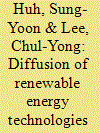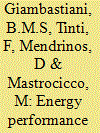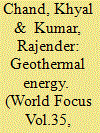|
|
|
Sort Order |
|
|
|
Items / Page
|
|
|
|
|
|
|
| Srl | Item |
| 1 |
ID:
132658


|
|
|
|
|
| Publication |
2014.
|
| Summary/Abstract |
Renewable energy technologies (RETs) have attracted significant public attention for several reasons, the most important being that they are clean alternative energy sources that help reduce greenhouse gas emissions. To increase the probability that RETs will be successful, it is essential to reduce the uncertainty about its adoption with accurate long-term demand forecasting. This study develops a diffusion model that incorporates the effect of competitive interrelationships among renewable sources to forecast the growth pattern of five RETs: solar photovoltaic, wind power, and fuel cell in the electric power sector, and solar thermal and geothermal energy in the heating sector. The 2-step forecasting procedure is based on the Bayus, (1993. Manage. Sci. 39, 11, 1319-1333) price function and a diffusion model suggested by Hahn et al. (1994. Marketing Sci. 13, 3, 224-247). In an empirical analysis, the model is applied to the South Korean renewable energy market.
|
|
|
|
|
|
|
|
|
|
|
|
|
|
|
|
| 2 |
ID:
162302


|
|
|
|
|
| Summary/Abstract |
Residential heating, cooling and Domestic Hot Water (DHW) production are responsible for a significant part of the residential energy consumption in Greece, which is currently based on the consumption of fossil fuels. A solution for the reduction of fossil fuel use -and all the negative effects that their use implies- is the application of renewable energy technologies, among which Ground Source Heat Pump (GSHP) systems are included. The present study examined awareness and adoption intention issues concerning this technology in Greece, through the conduction of a questionnaire survey. Specifically, it investigated public's knowledge on issues involving this technology, intention of installing it in households, main information sources and installation barriers. Socioeconomic and residence characteristics, as well as consumers’ preferences and attitudes affecting the knowledge and adoption issues were examined. Factors affecting the subjects under investigation are gender, age, education level, environmentally friendly behavior and awareness, as well as having an occupation, studies or interests related to environment, technology or engineering. Additionally, the intention of installing a GSHP system is affected by specific household characteristics, infrastructure and consumers’ preferences on characteristics of heating systems. In order to promote GSHPs, suitable financial incentives, regulatory improvements and awareness activities are required.
|
|
|
|
|
|
|
|
|
|
|
|
|
|
|
|
| 3 |
ID:
121312


|
|
|
|
|
| Publication |
2013.
|
| Summary/Abstract |
This paper proposes an artificial neural network (ANN) technique as a new approach to evaluate the energy input, losses, output, efficiency, and economic optimization of a geothermal district heating system (GDHS). By using ANN, an energetic analysis is evaluated on the Afyon geothermal district heating system (AGDHS) located in the city of Afyonkarahisar, Turkey. Promising results are obtained about the economic evaluation of that system. This has been used to determine if the existing system is operating at its optimal level, and will provide information about the optimal design and profitable operation of the system. The results of the study show that the ANN model used for the prediction of the energy performance of the AGDHS has good statistical performance values: a correlation coefficient of 0.9983 with minimum RMS and MAPE values. The total cost for the AGDHS is profitable when the PWF is higher than 7.9. However, the PWF of the AGDHS was found to be 1.43 for the given values. As a result, while installing a GDHS, one should take into account the influences of the PWF, ambient temperature and flow rate on the total costs of the system in any location where it is to be established.
|
|
|
|
|
|
|
|
|
|
|
|
|
|
|
|
| 4 |
ID:
127232


|
|
|
|
|
| Publication |
2014.
|
| Summary/Abstract |
Use of shallow geothermal energy, in terms of ground coupled heat pumps (GCHP) for heating and cooling purposes, is an environmentally-friendly and cost-effective alternative with potential to replace fossil fuels and help mitigate global warming. Focusing on the recent results of the GEO.POWER project, this paper aims at examining the energy performance strategies and the future regional and national financial instruments for large scale introduction of geothermal energy and GCHP systems in both residential and industrial buildings.
After a transferability assessment to evaluate the reproducibility of some outstanding examples of systems currently existing in Europe for the utilisation of shallow geothermal energy, a set of regulatory, economic and technical actions is proposed to encourage the GCHP market development and support geothermal energy investments in the frame of the existing European normative platforms. This analysis shows that many European markets are changing from a new GCHP market to growth market. However some interventions are still required, such as incentives, regulatory framework, certification schemes and training activities in order to accelerate the market uptake and achieve the main European energy and climate targets.
|
|
|
|
|
|
|
|
|
|
|
|
|
|
|
|
| 5 |
ID:
153173


|
|
|
|
|
| Publication |
London, Elsevier, 2014.
|
| Description |
xi, 376p.pbk
|
| Standard Number |
9780128010273
|
|
|
|
|
|
|
|
|
|
|
|
Copies: C:1/I:0,R:0,Q:0
Circulation
| Accession# | Call# | Current Location | Status | Policy | Location |
| 059079 | 333.79/TOW 059079 | Main | On Shelf | General | |
|
|
|
|
| 6 |
ID:
135489


|
|
|
|
|
| Summary/Abstract |
In the other words we can say that geothermal sites in India have a great potential to produce electricity and which can supplement her current and prospective energy crisis. It can contribute great potential and huge environmental benefits India must seriously put efforts on harnessing her least explored alternative source of energy. Therefore geothermal power can become a valuable source of energy if it will properly harness in our country.
|
|
|
|
|
|
|
|
|
|
|
|
|
|
|
|
| 7 |
ID:
191195


|
|
|
|
|
| Summary/Abstract |
Geothermal energy is a constant, reliable source of energy which has the potential to play a key role in decarbonisation of the heating of buildings in the UK. At present it is underutilized, making up just 4.5 per cent of renewable energy used in the UK, and a significant reason for this is the lack of clear regulatory framework for addressing the environmental impacts and supporting private investment. This article identifies the environmental and financial risks of both shallow and deep geothermal energy and analyses if, how, and to what extent they are addressed in the current regulatory regime. It finds that regulation of the environmental impacts is piecemeal and recommends reform of the regulatory regime to cover all geothermal energy systems and operations. This article also finds that the current regulatory framework fails to address the significant upfront costs of both shallow and deep geothermal energy operations or the potential for depletion of the geothermal resource on which they depend. It highlights the need for a regulatory regime that protects geothermal energy resources from overabstraction and balances the interests of multiple users, and for financial incentives to encourage growth of both the shallow and deep geothermal energy industries.
|
|
|
|
|
|
|
|
|
|
|
|
|
|
|
|
| 8 |
ID:
181455


|
|
|
|
|
| Summary/Abstract |
Energy transitions require a rethinking of the role of public authorities to integrate public views and concerns. Through a case study in Geneva, Switzerland, this article examines how the public sees the role of the public authority in the transformation of a local energy system by developing a canton-wide geothermal program. We use a public values perspective, identifying public values linked to the roles and responsibilities of the state. Analyzing public values allows understanding how the public perceives state actions and consequently how the authority may adequately respond and accommodate these expectations and doing so, anchor policies in public values. We begin by exploring the concepts of public value and posing the contextual background. The article then presents the most salient public values linked to the roles and responsibilities of the authorities based on focus group data. For residents the most important function of the public authority in relation to energy transitions is to inform and raise awareness. Other important functions are providing financial support and regulating. Acknowledging the importance of communication and its associated values allows public authorities to set the anchor to then effectively roll out, plan or support energy transition projects.
|
|
|
|
|
|
|
|
|
|
|
|
|
|
|
|
| 9 |
ID:
125480


|
|
|
|
|
| Publication |
2013.
|
| Summary/Abstract |
Shallow geothermal energy is a renewable energy resource that has become increasingly important. However, the use has environmental, technical and social consequences. Biological, chemical, and physical characteristics of groundwater and subsurface are influenced by the development of this resource. To guarantee a sustainable use it is therefore necessary to consider environmental and technical criteria, such as changes in groundwater quality and temperature. In the current study a comprehensive overview of consequences of geothermal systems in shallow aquifers is provided. We conclude that there is still a lack of knowledge on long-term environmental consequences. Due to local differences in geology and hydrogeology as well as in technical requirements, it is not recommendable to define only static regulations, such as fixed and absolute temperature thresholds. Flexible temperature limits for heating and cooling the groundwater and subsurface are therefore advisable. The limits should be oriented on previously undisturbed temperatures, and chemical, physical and biological conditions of aquifers. Based on these findings, recommendations for a sustainable policy for shallow geothermal systems are provided including a potential legal framework for a sustainable use.
|
|
|
|
|
|
|
|
|
|
|
|
|
|
|
|
|
|
|
|
|